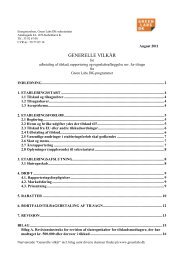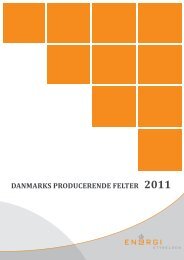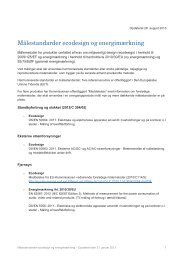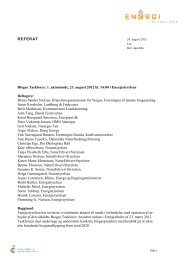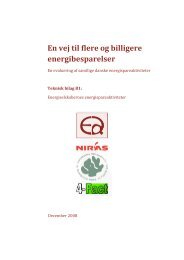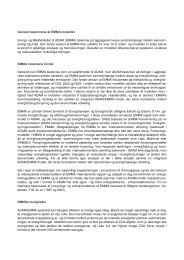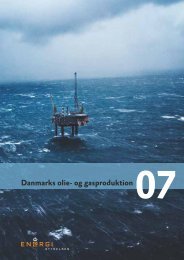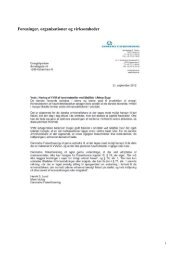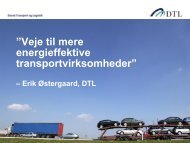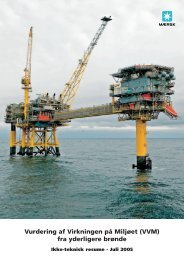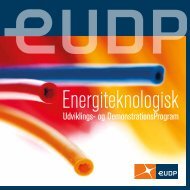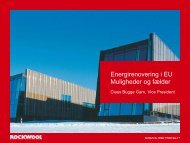Energy Strategy 2050 – from coal, oil and gas
Energy Strategy 2050 – from coal, oil and gas
Energy Strategy 2050 – from coal, oil and gas
Create successful ePaper yourself
Turn your PDF publications into a flip-book with our unique Google optimized e-Paper software.
Background The government will<br />
Good framework conditions for future<br />
electricity <strong>and</strong> heat production<br />
A large part of Denmark’s consumption of fossil fuels, in<br />
the form of <strong>coal</strong> <strong>and</strong> <strong>gas</strong>, is used to produce electricity<br />
<strong>and</strong> district heating. Extensive conversion of the electricity<br />
<strong>and</strong> heating sector to renewable energy is an essential<br />
step towards independence of fossil fuels.<br />
Since supply technologies <strong>and</strong> infrastructure in electricity<br />
<strong>and</strong> heat production generally have very long life spans,<br />
in many cases there will be only one opportunity to convert<br />
before <strong>2050</strong>. It is anticipated that a great number<br />
of Danish plants will either be taken out of operation or<br />
will wear out before 2020 <strong>and</strong> have to invest if they are<br />
to maintain production of heat . All things being equal, it<br />
will be cheaper to replace worn out installations than to<br />
replace still functioning installations. Therefore, the most<br />
appropriate solution is to make the shift away <strong>from</strong> fossil<br />
fuels when an existing plant is worn out. Furthermore,<br />
it must be anticipated that electricity consumption will<br />
increase as an ever greater share of energy consumption<br />
is electrified. It is therefore important that frameworks are<br />
established today which underpin investments in technologies<br />
bringing us closer to the <strong>2050</strong> target.<br />
Furthermore, in the short term, the need for new RE<br />
capacity is justified by the target of a 30% share of renewables<br />
by 2020. Meeting <strong>and</strong> upholding this target will<br />
require significant efforts in the years to come.<br />
Being the most developed <strong>and</strong> most cost-effective<br />
sources of energy, biomass <strong>and</strong> wind will play primary<br />
roles in an energy system without fossil fuels. In the<br />
long term, other technologies may also come into play.<br />
Continued support will therefore be necessary for the<br />
development of a wide range of RE technologies.<br />
As a general rule, the government’s goal of fossil fuel<br />
independence means no use of fossil fuels in <strong>2050</strong>.<br />
However, the government will not a priori exclude some<br />
use of <strong>coal</strong> with CCS, if this turns out to be an efficient,<br />
feasible <strong>and</strong> environmentally appropriate solution in a<br />
green transition.<br />
• Launch an in-depth review of electricity supply legislation<br />
<strong>and</strong> regulation in order to ensure that incentives<br />
<strong>and</strong> rules support the transition to fossil fuel independence.<br />
In the long term, other areas of energy<br />
supply will also be reviewed<br />
• Allocate DKK 20 million for strategic energy planning<br />
partnerships between municipalities, local companies<br />
<strong>and</strong> energy companies. These funds are to promote<br />
the integrated development of energy dem<strong>and</strong> <strong>and</strong><br />
energy supply which underpins the transition to fossil<br />
fuel independence. This is to take place e.g. through<br />
the expansion of district heating<br />
• Allocate DKK 10 million for demonstration of large<br />
heat pumps in the district heating sector, <strong>and</strong> analyse<br />
the conditions for, <strong>and</strong> implications of, the phasing-in<br />
of large heat pumps<br />
• Allocate DKK 20 million for geothermal energy exploration<br />
projects<br />
• Extend the existing PSO scheme that supports small<br />
electricity-producing renewable energy technologies<br />
such as wave power, bio-<strong>gas</strong>ification <strong>and</strong> solar<br />
photovoltaics for a further four years, so that a total<br />
of DKK 100 million is allocated for the period<br />
• Allocate DKK 10 million to support demonstration<br />
projects on solar heating for household solutions,<br />
including use of solar heating in combination with<br />
other RE solutions such as heat pumps. Efforts will<br />
also include an information campaign <strong>and</strong> the launch<br />
of a certification/quality assurance scheme<br />
• Work for a revision of the EU’s CHP Directive towards<br />
an efficient energy system in a future EU free of fossil<br />
fuels.<br />
<strong>Energy</strong> <strong>Strategy</strong> <strong>2050</strong> <strong>–</strong> <strong>from</strong> <strong>coal</strong>, <strong>oil</strong> <strong>and</strong> <strong>gas</strong> to green energy.<br />
31



